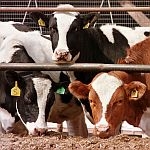 (Host) Dairy farmers are about to get a small, temporary raise.
(Host) Dairy farmers are about to get a small, temporary raise.
The federal government decided Friday to boost the support price it pays when it buys cheese and powdered milk.
As VPR’s Ross Sneyd reports, Vermont officials say it’s about time.
(Sneyd) Dairy farmers have been earning about half this year what they made last year.
They’re getting $11 for every hundred pounds of milk – even though it costs closer to $18 to produce that milk.
The U.S. Department of Agriculture says it will pay more for cheese and powdered milk, which will send around $243 million directly back to farms.
Vermont Agriculture Secretary Roger Allbee says that should add $1.25 to $1.50 to the hundredweight price paid to farmers.
(Allbee) "But I hope it will be enough for dairy farmers in Vermont and the Northeast to understand we’re all aggressively trying to find ways to reform the system long term and hold on long enough for us to try to get that done."
(Sneyd) That long-term fix was something that was on the mind of all Vermont policymakers.
Senator Patrick Leahy helped to organize his colleagues into a coalition that persuaded the Obama administration to release money now.
He says more needs to be done to deal with the future.
(Leahy) "You can’t have this boom bust thing all the time. When you have farms that are losing as much as $100 a cow a month, there’s no way they can in business like that."
(Sneyd) The question is what can be done beyond the short-term infusion of cash authorized by the USDA.
One approach that Vermont’s congressional delegation is pursuing is to boost the money that goes into the Milk Loss Income Contract program – known as MILC.
Here’s Senator Bernie Sanders.
(Sanders) "The difficulty is that agricultural pricing, I think most people understand, is archaic. It is not relevant for the time period that we’re in right now. And it needs to be rethought fundamentally. This is not easy stuff. And one of the reasons it’s not easy is that farmers themselves – this is not just Washington, but it’s farmers themselves – are in disagreement."
(Sneyd) Sanders believes a supply management system that would discourage ever-higher production by farmers is a central part of the solution.
Some farmers agree with that approach, but it’s been controversial and there’s no consensus.
For VPR New, I’m Ross Sneyd.